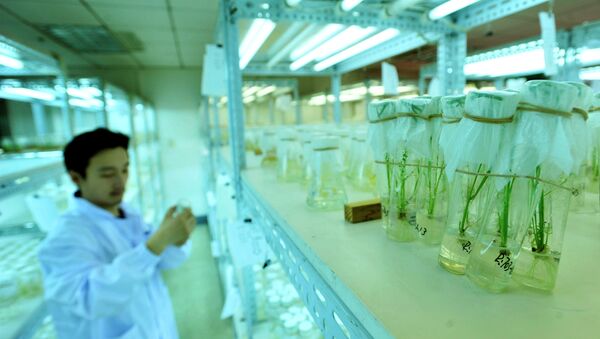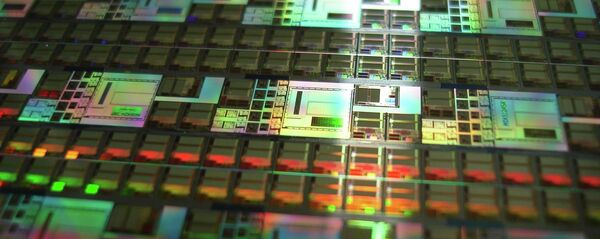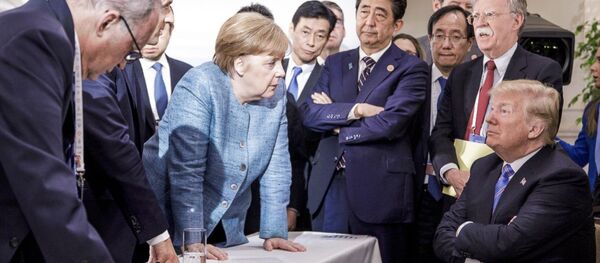At the advice of the US National Institutes of Health (NIH), the Johns Hopkins University School of Medicine in Baltimore, Maryland, has placed on hold all appointments for scientists visiting from foreign countries until the NIH "feels we can safely allow foreign nationals to be involved with government-sponsored research," according to an email to school faculty last month that was obtained by the South China Morning Post.
"Effective immediately, the Johns Hopkins School of Medicine is temporarily halting the appointment of visiting scientists due to concerns voiced by the National Institutes of Health [NIH] about threats to biomedical research and loss of intellectual property," the email continues.
Cancellation of the program could affect 1,000 visiting scientists if it lasts for a year, a US-based Chinese biomedical researcher told the Post.
While it affects visiting scientists from all countries, the measure is aimed primarily at Chinese researchers, who the US government has claimed are stealing government-funded research and taking it back to their home country through a program called the Thousand Talents Plan that aims to attract expatriate Chinese academics back to China.
US Intelligence Fears Tech Theft
US intelligence leaders sounded the tocsin over Thousand Talents earlier in 2018, when the National Intelligence Council produced a report on the program in April. A June House Armed Services Committee meeting with Pentagon and intelligence officials further increased scrutiny over the growing danger of the program, which the US National Intelligence Council concluded had a more surreptitious goal than stated: "to facilitate the legal and illicit transfer of US technology, intellectual property and know-how," Bloomberg reported at the time.
FBI officials met with over 100 leaders from 20 Texas academic and medical institutions on August 8 to warn them about "attempts by foreign adversaries to steal from our institutions for their benefit," FBI Special Agent in Charge Perrye K. Turner said at the time, the Houston Chronicle reported. Among those institutions represented were campuses in the University of Texas and Texas A&M systems, the University of Houston, MD Anderson Cancer Center, Baylor College of Medicine and Houston Methodist Hospital. Noting that the bureau wanted to establish, cultivate and enhance a private-public relationship to mitigate those attempts, Turner said, "It is incumbent on us, given the importance of medical and academic institutions in Houston, to create platforms to share information to mitigate the risks and prevent theft."
Donald Lichay, FBI supervisory special agent, said that officials provided the attendees with "classified information about direct threats, both in Houston and nationally," because they "really wanted the institutions to hear some of the information we've collected so they believe the threat's real," suggesting the idealism of the academic community would make it hard for them to believe their colleagues would behave disingenuously.
Later that month, the NIH put out a bulletin to over 10,000 US academic and research institutions, urging them to ensure that recipients of NIH grants were properly reporting their foreign ties.
"We have long understood, however, that the robustness of the biomedical research enterprise is under constant threat by risks to the security of intellectual property and the integrity of peer review," the August 23 statement said. "This knowledge has shaped our existing policies and practices, but these risks are increasing."
Among the problems identified by the institute include the "diversion of intellectual property in grant applications or produced by NIH-supported biomedical research to other entities, including other countries;" and "in some instances, sharing of confidential information by peer reviewers with others, including in some instances with foreign entities."
The risks posed by this include "efforts to protect our national security interests" and "unacceptable breaches of trust and confidentiality that undermine the integrity of US biomedical research," and so the NIH advised clamping down on reporting of funding sources and foreign affiliations, leading Johns Hopkins Medical to its present course of action.
China's Thousand Talents Program
But what exactly is China's Thousand Talents Program, and does it pose the risk to US research institutions that federal agencies believe it does?
The Thousand Talents Program began in 2008 as a way to attract the huge numbers of Chinese expatriate academics back to the People's Republic of China, something it aimed to do with lush contracts and coverage of expenses, according to a profile of the program published in Nature in July. The program has brought roughly 7,000 scientists to China, the vast majority of them Chinese (it's not necessary that you be a Chinese national to apply for the program) and requires that you both already be a leading academic at a non-Chinese institution and that you find a Chinese institution that wants to hire you.
Zhang Guixin, a professor from Tsinghua University and an expert on the Thousand Talents Plan, told the Global Times on August 27, "The US is the biggest beneficiary of talent flow. Now seeing China is doing the same thing, the US feels threatened. Its accusation against China is totally groundless and represents protectionism."
Chen Ning, who works under the program and is the CEO of a company in Shenzhen, told the Times that the reason the US leads the world technologically is because of its high rate of immigration, allowing it to attract the most talented academics from around the world. China, he said, is simply doing its best to emulate the United States' success in this field.
Emblematic of US fears are businessmen like Chen an especially Liu Ruopeng, a Chinese billionaire who used knowledge obtained during his time as a researcher in a US lab to build a highly successful tech company after returning to China. His former supervisor alleges Liu stole his idea for an "invisibility cloak," and a former assistant director of counterintelligence at the FBI even said Liu was sent to the US by the Chinese government to steal intellectual property.
Liu, who's known as "China's Elon Musk" according to Business Insider, is worth $2.7 billion. While studying under David Smith, one of the world's experts on metamaterials, at Duke University in North Carolina from 2006 to 2009, Liu and several other Chinese researchers took photos of Smith's "invisibility cloak" prototype. The cloak is made of a material that hides its contents from microwave signals.
After returning to China and founding his tech company, Liu's lab contains a nearly exact replica of Smith's invisibility cloak. The FBI opened a case to investigate whether the incident was an example of intellectual property theft, but closed the case due to lack of evidence.
Trade War is Tech War
The fear of technology transfer to China is a contributing factor in many US policies as of late, most especially the ongoing tariff war, which Chinese officials have alleged is aimed at stemming technology transfer — both legal and illegal — from the US to China due to fears that Chinese tech may overtake American tech in the next several years.
"Make no mistake about it that we are — we are totally at war with China right now," Jim Phillips, CEO and chairman of the nanotechnology firm NanoMech, told Breitbart July 29. "It's not a war of bombs. It's a war of cyberwarfare, and it's also a war of GDP and jobs. And the one that has the most GDP and the jobs is going to be the clear winner."
To that end, the US' trade war with China is aimed in large part at curbing Chinese industrial strength. "America will no longer have a disproportionate financial advantage that gives it the moral, economic and the leadership authority it has now," Phillips said about the US falling behind in advanced industries like nanotech. "When this happens, America loses; the world changes. Everything changes… [China] won't have to use its military."







